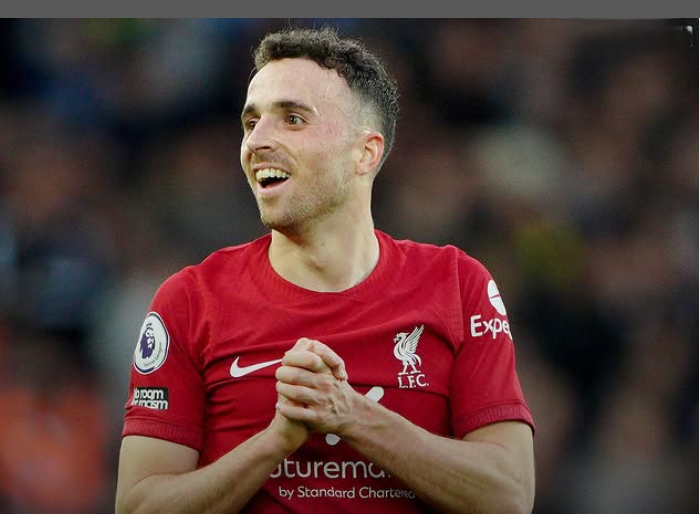Liverpool’s pay for Diogo Jota represented the team’s harmony between rewarding consistency and precisely controlling its wage structure. With a weekly salary of £140,000, or £7.28 million a year, Jota was slightly behind the highest paid player in Liverpool, but his services were extremely valuable when the team’s stability was put to the test. Fans frequently compared salaries to goals and assists, but Jota’s constant pressure, versatility in the forward line, and talent for scoring goals made his weekly salary appear unexpectedly low given what Liverpool got in exchange.

Questions were raised about whether the £45 million he paid to leave Wolves in 2020 was a wise investment. Critics were silenced within weeks by his deft movement and crisp finishing, especially when he scored important Champions League goals. He stepped in for injured or worn-out colleagues with ease during the ensuing seasons, developing into a highly adaptable attacker who could play centrally or drift wide. The club’s 2022 decision to extend his contract until 2026 demonstrated a particularly creative understanding of his significance as a key component of the new attacking identity rather than just a stand-in for star players.
Bio Data and Professional Information
| Name | Diogo José Teixeira da Silva (Diogo Jota) |
|---|---|
| Date of Birth | December 4, 1996 – Porto, Portugal |
| Age | 27 (at time of last Liverpool contract) |
| Position | Forward (AM RL, ST) |
| Club | Liverpool FC (2020–2025) |
| Weekly Salary | £140,000 |
| Annual Salary | £7,280,000 |
| Gross Career Earnings | $53,803,661 (estimated) |
| Net Worth | £42,224,000 (approx.) |
| Contract Expiry | June 30, 2026 |
| Reference | Spotrac – Diogo Jota |
In contrast to Liverpool’s pay structure, Jota’s contract was strategically positioned. Mohamed Salah’s weekly salary of about £350,000 reflected his international fame and years of unbeaten performance. The defense’s mainstay, Virgil van Dijk, also earned a wage that was far greater than Jota’s. However, Jota’s deal was quite effective when compared to other European forwards with comparable production. When compared to Chelsea’s Kai Havertz or Manchester United’s Antony, who both made more money but produced fewer game-changing performances, his goals per minute and impact in high-stakes games were far lower.
His career’s financial side provides a more comprehensive picture. Jota’s gross career earnings exceeded $53 million; by 2025, contractual adjustments brought her earnings down to over $57 million. Despite their striking appearance, these figures reveal a very distinct journey: a young man from Gondomar, Portugal, making his way onto Europe’s biggest stages and turning potential into enduring worth. His estimated net worth was above £42 million, which included endorsements and the publicity that comes with playing for a team like Liverpool, which has a global following, in addition to his salary. The way that football now offers financial alternatives off the field is especially creative; brand collaborations, gaming, and streaming give a player’s portfolio more depth.
Football salaries, however, are never merely numbers; they also signify a team’s symbolic standing. Jota wasn’t untouchable, but she was essential. Although Liverpool regarded him as a dependable engine, his pay indicated to peers and supporters that he was not in the top tier. His goals frequently saved points or advanced the team further into tournaments, which sparked discussions about fairness. For many, the discrepancy demonstrated how marketability, brand recognition, and longevity in the spotlight all affect wages in addition to output.
The wider cultural discussion concerning football salaries always comes up. Although £140,000 a week may seem excessive to the typical football fan, it is a carefully considered calculation in the football economics. Clubs reward performance and the capacity to perform at times that determine titles and earnings, not the number of hours worked. When compared to mid-tier forwards in Europe, Jota’s pushing, finishing, and tactical flexibility were noticeably better, and his salary reflected this difference. His crucial league contributions and his part in the FA Cup and League Cup wins demonstrated that his deal was a wise investment rather than an indulgence.
Another intriguing element was added by Jota’s off-pitch character. He developed a personal brand that allowed him to reach younger audiences. He was an avid gamer and FIFA fan who embraced esport with a ferocity very akin to that of football. His Liverpool contract did not specifically reflect this, but it demonstrated how contemporary athletes raise their profile. By doing this, he guaranteed commercial relevance beyond the 90 minutes, which is a crucial component in preserving both financial stability and public relevance in today’s entertainment-driven society.
His ascent carried emotional weight in Portugal. His success was seen by Gondomar, the little northern city where he and Rute Cardoso started their quest, as evidence that hard work and determination can change fates. Although on a different scale, his financial rise paralleled that of other Portuguese legends like Cristiano Ronaldo and served as a reminder to supporters that football is still a very flexible social mobility tool. Jota’s career showed how ambition, when backed by discipline, can produce surprisingly successful results by matching skill with opportunity.
Socially speaking, his pay was more than just a symbol of his own fortune; it was a measure of dependability in a club environment that is always looking for equilibrium. Jota was the glue—able to score, press, and adjust without complaining—while Salah shone and Van Dijk held sway. That necessary but subtle identity was reflected in his pay. In many respects, it made his contract incredibly long-lasting, protecting Liverpool from uncertainty.
